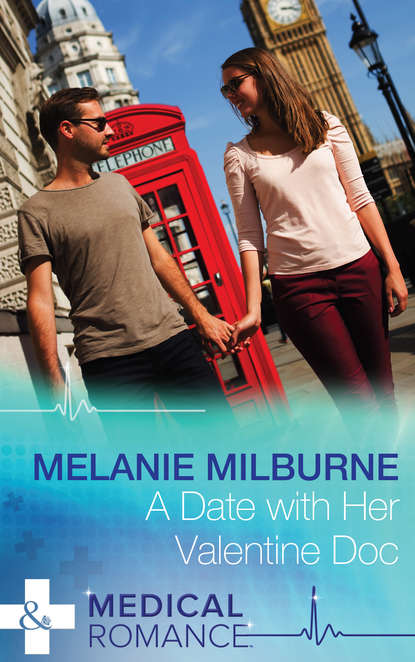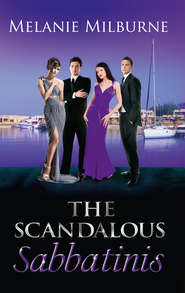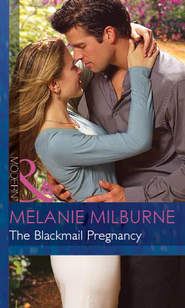По всем вопросам обращайтесь на: info@litportal.ru
(©) 2003-2024.
✖
A Date with Her Valentine Doc
Автор
Год написания книги
2019
Настройки чтения
Размер шрифта
Высота строк
Поля
Matt picked up his coffee cup and surveyed me as he took another sip. ‘How long have you been at St Ignatius?’
‘Ten and a half months.’
‘Where were you before here?’
‘St Thomas’,’ I said, and tossed the question back, even though I already knew the answer because I’d overheard two of the nurses talking about him in the change room. ‘You?’
‘I trained in London and spent most of my time at Chelsea and Westminster, apart from the last twelve months in the US.’
I wondered why he had gone abroad and if it had anything to do with a woman, here or over there. I hadn’t heard anything about his private life. Word has it he kept it exactly that—private.
My phone beeped with an incoming message and I glanced down to see it was a text from Jem.
How r u doing? it said.
I quickly typed back. Fine.
Within seconds she typed back. What did everyone say?
I typed back. I haven’t told them.
She came back with, Y not?
I typed back the emoticon smiley face with red cheeks. She sent me a smiley face with love hearts for eyes. It was times like this I was truly glad I had a sister. She knew me better than anyone. She knew I needed time to sort my feelings out, to get my head around the idea of being single again.
I had a feeling she also knew it was not so much my heart that was broken but my pride. It’s not that I didn’t love Andy. I loved him from the moment I met him. He was charming and funny and made me feel as if I was the most important person in his life … for about a month. I know all relationships take work and I put in. I really did. It’s just he hadn’t factored in my career. His always came first. It caused many an argument. I mean, it’s not as if someone’s going to die if he doesn’t show up for work. He never seemed to understand I couldn’t take off a day whenever I felt like it because he was bored and wanted company.
I put my phone back in my jeans pocket and met Matt Bishop’s inscrutable gaze. I wondered if he could see any of the thought processes of my brain flitting over my face. I like to think I can keep my cards pretty close, but something about his intense grey-blue eyes made me feel exposed, as if all my insecurities and doubts were lined up on show for his perusal.
‘Any further questions?’ I asked, with a pert look.
He held my look for an extra beat. ‘Not at the moment.’
I turned on my heel and scooted out of there. Colour me suspicious, but I had a feeling there was not much that would get past Dr Matt Bishop’s sharply intelligent grey-blues.
Theatre was tense but, then, Stuart McTaggart always operated that way. He wasn’t one of those surgeons who chatted about what he did on the weekend or how well his kids were doing at Cambridge or Oxford—yadda-yadda-yadda. He didn’t have classical music playing, like a couple of the other surgeons on staff did. He insisted on absolute silence, apart from when he had something to say. I’d had to learn early on to button my lips while in Theatre with him. He was gruff to the point of surly and he barked out orders like a drill sergeant. Some of the junior theatre staff found him terrifying. Some of the more senior staff hated working with him.
Funnily enough, I didn’t find him too hard to handle. I understood the pressure he was under. Patients were more demanding of good outcomes than in the past, or at least they had better access to legal representation and were more aware of their rights. The litigious climate meant a lot of clinicians at the pointy end of medicine were under far greater pressure and scrutiny than ever before. That could be a good and a bad thing depending on the circumstances. It was part of why I wanted to pursue my research. Reducing the stress of the hospital experience was a win-win for everyone. Apart perhaps from the greedy lawyers, of course, but don’t get me started.
Stuart McTaggart was operating on a twenty-seven-year-old man with a very vascular and awkwardly placed benign brain tumour. Jason Ryder was a recently married man with a baby on the way. He was a keen sportsman, playing semi-professional golf. He had collapsed whilst playing in a tournament and been admitted to St Iggy’s via A and E. All was going well until he developed a bleed. Alex Kingston, the surgical registrar, was the first to cop the flak from Stuart.
‘Suck the blood out of the way, Kingston!’ he said. ‘I can’t diathermy bleeders if they’re underwater!’
Next in line was Leanne Griffiths, the scrub nurse.
‘Be aware of what’s happening in the operation, Sister Griffiths. I can’t wait around while you call for more swabs. They should be open, on the table, ready when I need them. Which is now!’
Then it was my turn. Woot. Woot.
‘What blood pressure have you got this patient running at, Dr Clark? He looks hypertensive to me and that’s not assisting with this blood loss!’
And on it went. Everyone was to blame except Stuart. But, then, really, no one was to blame—it was just the nature of the tumour and the stress of trying to remove it with minimal damage to the normal brain. The human body was not always predictable. Things didn’t always work out. They weren’t working out now. The only way to eventually stop the haemorrhage was to ligate a couple of largish vessels, causing irreparable damage to a large part of what had been a normal brain.
The person I’d anaesthetised wasn’t going to be the person who woke up … if he woke up. I hated even thinking those words. I always focussed on the positive. It gave great comfort to loved ones if they could hold onto hope for as long as possible.
I went down to ICU with the patient, keeping an eye on the monitor as we went. I was trying not to be influenced by the air of doom and gloom that had blown up in Theatre. I had seen patients much worse than Jason recover. It was a setback, certainly, but with time and patience and careful monitoring he had a chance, maybe even better than expected, given his level of fitness.
Once Jason was settled on the ventilator I went out to the family waiting in the relatives’ room. His wife, Megan, was about six months pregnant and stood with Jason’s parents as soon as I came in. ‘How is he?’ she said, holding her hand over her belly as if to protect her baby from hearing bad news.
‘The operation was very difficult, Megan,’ I said in a gentle but calm tone. ‘The tumour had a lot of blood running through it. Mr McTaggart was able to get it out, but not without bleeding, and there is likely a bit of damage to some of the surrounding brain. It’s impossible to tell at this stage how he’s going to be. There’s no choice but to wait and see what effect the tumour and the operative trauma has had. But it’s important to keep positive and try not to feel too overwhelmed at this stage. Everything that can be done is being done to bring about the best possible recovery for Jason.’
There was a sound behind me and I turned to see Matt Bishop come in. ‘I’m sorry to keep you waiting,’ he said, briefly shaking hands with Jason’s parents and then Megan. ‘I’m Matt Bishop, the head of ICU.’
Jason’s father Ken swallowed thickly. ‘What’s happening to our boy?’
‘He’s being ventilated and kept in an induced coma,’ Matt said. ‘During surgery there was a major bleed from the tumour bed. Mr McTaggart was able to stop the bleed, but it’s possible normal brain may have been damaged in the process. When the brain swelling has decreased, we’ll gradually reduce the sedation, and see what effect the surgery has had. But I should warn you that surgery to a vascular tumour like this, and the bleeding that goes with trying to remove it, can cause a lot of damage. I’m sorry but there’s a possibility he won’t wake up.’
Jason’s mother put a shaky hand against her throat. ‘You mean he could … die?’
Matt’s expression was grave. ‘A bleed like the one Jason suffered can damage vital areas of the brain. In the morning we’ll repeat the CT scan and try to assess what physical damage has occurred. We might be able to predict from that how he might recover. In the end, though, we just have to wait, try to wean him off sedation and see if he wakes up.’
The word lingered in the air like a toxic fume.
If, not when he wakes up.
I watched as the hope on Jason’s mother’s face collapsed, aging her a decade. I saw the devastation spread over Megan’s, distorting her young and pretty features into a mask of horror. Jason’s father’s face went completely still and ashen. All their hopes and dreams for their son had been cut down with one two-letter word.
Matt answered a few more questions but it was obvious to me that the poor family weren’t taking much in. They were still trying to get their heads around the fact the son and husband they had kissed that morning on his way to the operating theatre might not come back to them.
My heart ached for them. I know as a doctor you’re supposed to keep a clinical distance. And I do most of the time. But now and again a patient comes along who touches you. Jason was such a normal, nice type of guy. He was exactly the same age as me. His family were loving and supportive, the sort of family who loved each other unconditionally. I thought of the baby in Megan’s womb who might never get to know his or her father. I thought of the implications for Megan, trapped in a marriage to a man who might be permanently disabled, unable to talk, to eat or drink unassisted. Then there were the bathing and toileting issues—the whole heartbreaking scenario of taking care of someone who could no longer do anything for themselves. Her young life would be utterly destroyed along with his.
Once Matt left I took the family to my relaxation room where my aromatherapy infuser was releasing lavender and tangerine, which had a calming effect and was shown to be beneficial in helping with anxiety and depression. I sat with them for a few minutes, handing them tissues scented with clary sage, another stress reliever, and listened as they talked about Jason. They told me about his childhood and some funny anecdotes about him as a teenager, and of his passion for golf and how hard he worked at his game. How they had mortgaged their house and forgone holidays for years in order to sponsor his career because they believed so unreservedly in his talent.
That’s the thing about busy hospitals these days. No one has time to sit with patients and their families and chat. Nurses are under the pump all the time with other patients to see to. The doctors have the pressure of clinical work and administrative duties, and in a teaching hospital such as St Iggy’s the responsibility of teaching medical students, residents and interns and registrars leaves little time to linger by a patient’s bedside. Often it was the cleaning or catering staff that counselled patients most, but even they were under increasing pressure.
I made a point of keeping some time for the patients, even though it meant my days were a little longer than normal. Looking back, I think that was one of the reasons Andy strayed. I just wasn’t around enough for him. That, and the assumption that because my parents had an open relationship I, too, would be happy with the same arrangement. Shows how little he knew me. But he knew how much I love my work. It’s not so much a career for me but a vocation. I love being able to help people and being with them through the darkest times is the most challenging but in many ways the most rewarding.
I caught up to Matt half an hour later just as he was coming out of his office. I didn’t wait to be invited in. I put my hand flat on the door just as he was about to close it. ‘Can I have a word?’
He drew in a breath and released it with a sound of impatience. ‘I have a meeting in five minutes.’
‘I’ll be brief.’
He opened the door and I walked past him to enter his office. My left arm brushed against his body as I went. I brush past people all the time. It’s hard not to in a busy and often crowded workplace, especially in ICU or Theatre. But I had never felt a tingle go through me quite like that before. It was like touching a bolt of lightning. Energy zapped through my entire body from my arm to my lady land. I was hoping it didn’t show on my face. I’m not one to blush easily … or at least not until that morning. I stopped blushing when my parents went through their naturalist phase when I was thirteen. I think my blushing response blew a gasket back then. But right then I could feel warmth spreading in my cheeks. I could only hope he would assume it was because of the message I was there to deliver.
I got straight to the point. ‘Did you have to be so blunt with Jason Ryder’s wife and family? Surely you could’ve given them a little ray of hope? You made it sound like the poor man is going to die overnight or be a vegetable. I’ve seen much worse than—’
‘Dr Clark.’ His curt tone cut me off. ‘I don’t see the point in offering false hope. It’s better to prepare relatives for the worst, even if it doesn’t eventuate. It’s much harder to do it the other way around.’











